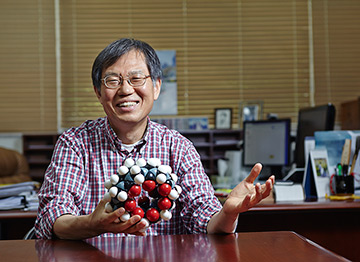mainmenu
Greetings

"Welcome to the Center for Self-assembly and Complexity (CSC), Institute for Basic Science (IBS)!"
The CSC was launched in August 2012 by the Korea government, as one of the Research Center of IBS, a newly established research institute in Korea that aims to brighten the future of mankind through basic scientific research.
The CSC primarily focuses on self-assembly under complex environments where several elements are mixed in nature as well as well-refined and limited environments, mainly studied until now, in order to overcome existing limitations in research on self-assembly. Through these studies we want desired properties to be manifested in self-assembly by controlling specific variables, or to create materials with such properties. Such basic research will address general questions in chemical and biology and may even provide a clue to the chemical origin of life and creation of artificial cells. It will also provide an opportunity to develop new types of materials such as emergent nanomaterials with fundamentally novel characteristics which cannot be achieved with classical systems.
Our research will inherently be interdisciplinary each of these areas investigates a new exciting frontier at the interface of chemistry, physics, biology, materials science and engineering. The CSC provides state-of-the-art and comprehensive research resources to support the needs of the CSC’s researchers. Pohang University of Science and Technology(POSTECH), on which the CSC is located, also offers state-of-the-art-facilities for multidisciplinary research including an advanced synchrotron radiation facility, Pohang Accelerator Laboratory(PAL)
We believe that the CSC will be a world-leading institute that provides exciting opportunities for study and research at the cutting edge of Chemistry and materials science. Our group leaders, researchers, staff and students work together to create and disseminate new knowledge, as well as personal fulfillment for everyone involved. Finally, I sincerely hope that many ambitious young researchers will participate in the CSC and grow into international leaders in the filed of Self-assembly and Complexity research.
Thank you
Director 


